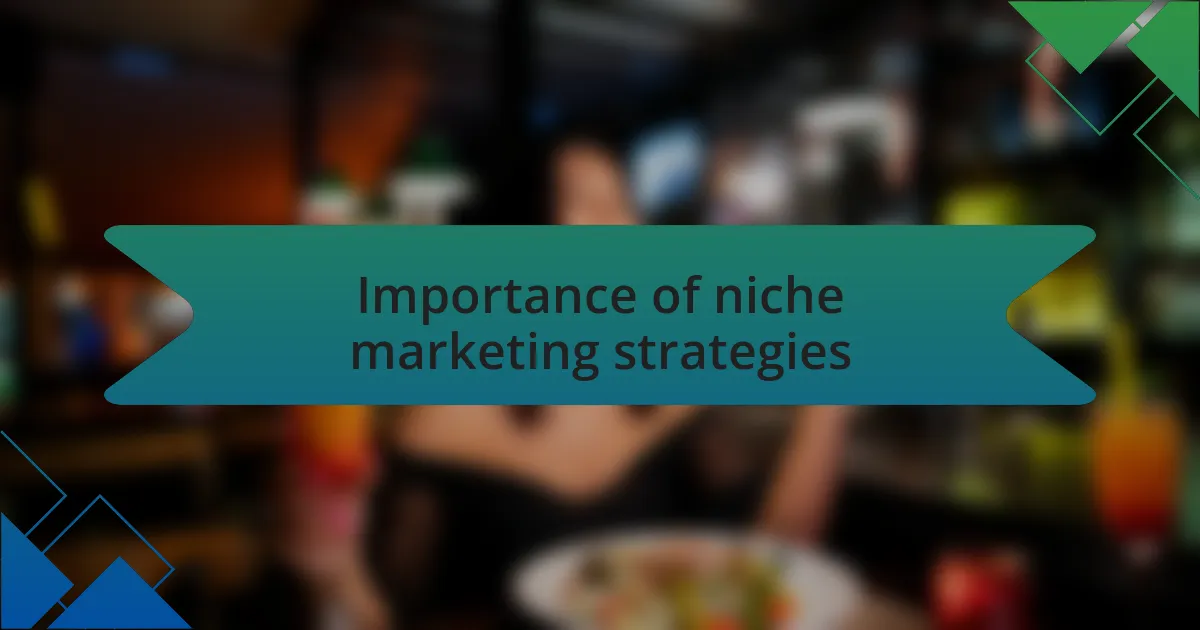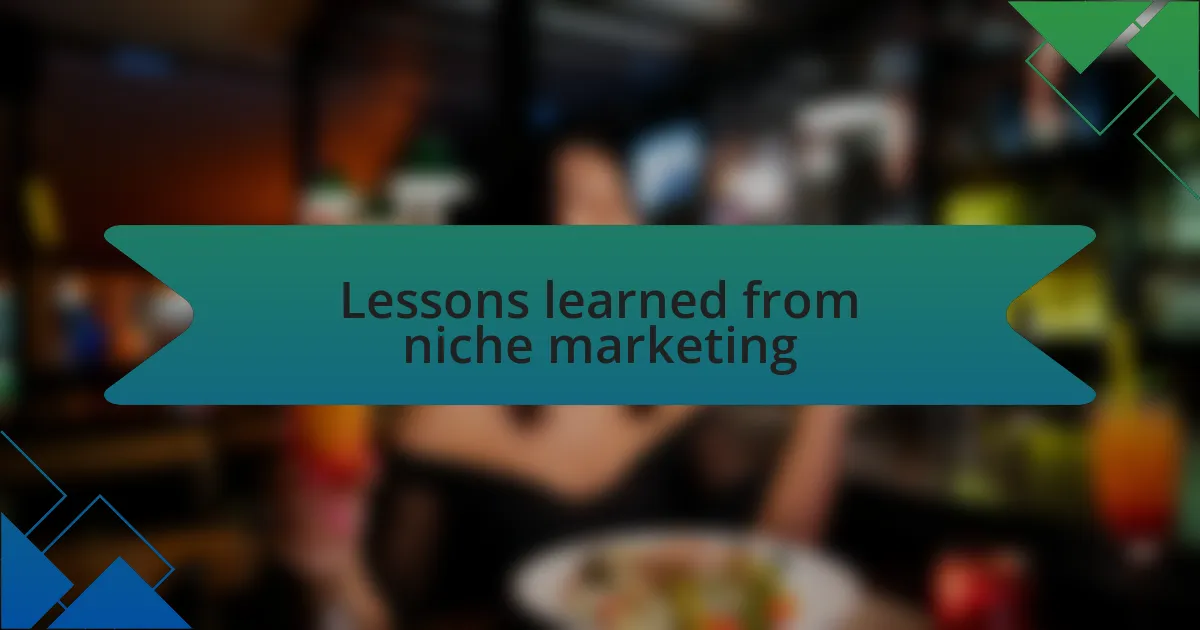Key takeaways:
- Niche marketing in gin emphasizes storytelling and authenticity, creating emotional connections with consumers.
- Understanding the target audience through demographics and social media engagement enhances marketing effectiveness.
- Developing a unique value proposition (UVP) involves showcasing what sets a brand apart and tapping into consumer passions.
- Exclusivity and collaboration with like-minded brands can amplify visibility and foster customer loyalty in niche markets.

Understanding niche markets in gin
Understanding niche markets in gin requires a deep dive into consumer preferences and lifestyle choices. I remember when I first discovered a local distillery offering handmade, lavender-infused gin. It sparked my curiosity about how certain botanicals can resonate with specific audiences. What creates that connection? It’s often about storytelling and authenticity.
When I spoke with the distillery’s owner, she highlighted that her brand wasn’t just about gin—it was about creating an experience that appealed to floral aroma lovers. This made me realize how niche marketing isn’t merely a strategy; it’s about tapping into emotions and creating a sense of belonging among consumers. Have you ever felt part of a community because of a shared passion for a specific flavor or ingredient in gin? That’s the power of niche markets.
In my experience, effective niche marketing can elevate a brand beyond its product. For instance, brands focusing on sustainability often attract a dedicated following of eco-conscious consumers. This isn’t just about selling gin; it’s about aligning values and creating a loyal customer base that feels invested in your mission. Isn’t it fascinating how a bottle of gin can carry so much more than just its contents?

Importance of niche marketing strategies
Niche marketing strategies are essential because they allow brands to focus their efforts on a specific audience, leading to more meaningful connections. I recall attending a craft gin festival where one brand stood out among the rest—they had developed a unique recipe that emphasized local ingredients. This approach not only captured the essence of the region but also resonated deeply with attendees who valued local produce. Isn’t it remarkable how narrowing your focus can amplify your message?
When a brand tailors its offerings to a niche market, it can effectively differentiate itself in a saturated industry. I once had a conversation with a bartender who exclusively served small-batch gin. He believed that by highlighting the stories behind each distillery, he was cultivating a community of gin aficionados. This insight hinted at a larger truth: niche marketing not only fosters loyalty but also elevates a product to a conversation starter among consumers. Have you ever chosen a brand because you felt a personal connection to its story?
Moreover, effective niche marketing can lead to increased customer retention, which is vital in today’s competitive landscape. A few years ago, I joined a gin subscription service that curated selections based on specific periods, like summer cocktails or holiday flavors. Each box felt like a personal gift, and I found myself eagerly awaiting its arrival every month. That experience reinforced how niche marketing nurtures emotional investment, creating not just customers but brand advocates. Don’t you think that kind of loyalty is invaluable?

Researching your target audience
Understanding your target audience is crucial for effective niche marketing. I remember when I first started exploring the gin market; I conducted surveys among my friends who enjoyed different spirits. Their preferences revealed that many sought out unique flavors and artisanal production methods rather than mass-produced options. Isn’t it fascinating how simply asking the right questions can uncover a treasure trove of insights?
In another experience, I analyzed social media interactions about various gin brands. I noticed that posts highlighting the craftsmanship behind a product often garnered more engagement compared to generic advertisements. This realization reinforced the value of tailoring content to reflect the interests of a specific audience. Have you ever felt more engaged with a brand that showcased its unique storytelling rather than one that simply pushed sales?
Diving deep into demographics can also provide clarity. Once I segmented my audience based on age and lifestyle, I discovered that younger consumers were particularly drawn to sustainable brands and eco-friendly packaging. This understanding helped me recommend gins that align with those values. It’s interesting how demographics can shape marketing tactics, isn’t it? The more you peel back the layers, the more you can fine-tune your approach to resonate with your audience.

Developing a unique value proposition
When it comes to developing a unique value proposition (UVP), I find that it starts with understanding what truly sets your brand apart. For instance, I remember launching a small gin brand that emphasized not only its handmade qualities but also the local botanicals sourced from nearby farms. This connection to the community created a compelling narrative that resonated with consumers who craved authenticity in their drinks. Have you ever tasted something that felt like it had a story behind it? That’s the kind of connection a strong UVP can foster.
Creating a UVP also involves reflecting on your personal passions and the experiences that drive you. I vividly recall chatting with patrons at a local distillery event, where I discovered that many were enthusiastic about the cocktail-making process—far more than just the finished drink. This insight led me to position my brand not just as a gin, but as an invitation to explore mixology, complete with recipes and guidance. It’s incredible how tapping into your audience’s interests can redefine your messaging, don’t you think?
As I developed my UVP further, I embraced the notion of scarcity. One approach that worked surprisingly well was highlighting limited-edition flavors inspired by seasonal ingredients. This tactic not only appealed to the collectors among gin enthusiasts but also encouraged a sense of urgency. Reflecting on my own excitement when trying something rare or exclusive, I realized how powerful that feeling could be in attracting consumers. Have you ever rushed to grab a special release out of fear that it might be gone forever? That’s the emotional hook a great UVP can create.

Lessons learned from niche marketing
Embracing niche marketing has taught me that understanding your audience is paramount. I recall preparing for a gin tasting event aimed specifically at craft cocktail enthusiasts. Feedback from attendees revealed that while they loved tasting, they were equally invested in the stories behind each product. This taught me to not just share the technical aspects of my gin, but to weave narratives that would resonate deeply with those who cherished the experience. Isn’t it interesting how connecting on a personal level can elevate a simple product into a cherished memory?
One vital lesson was the significance of community in niche markets. During a collaboration with local chefs, I learned that aligning with like-minded brands can enhance your product’s appeal. Engaging with their audience allowed us to tap into a customer base that valued quality and locality as much as we did. It’s remarkable how partnerships can create a ripple effect in reaching new consumers. Have you ever experienced a brand collaboration that felt like a match made in heaven? Those moments can truly amplify a brand’s visibility.
Lastly, I’ve come to appreciate the power of exclusivity in niche marketing. I remember launching a small-batch gin, limited to only a few hundred bottles. The excitement generated was palpable; consumers engaged with my brand on social media, sharing their finds and driving demand. Witnessing this urgency and passion firsthand reinforced the lesson that scarcity can not only enhance desirability but also foster a loyal customer base. Doesn’t that make you wonder how often we overlook the power of limited offerings in our own marketing strategies?